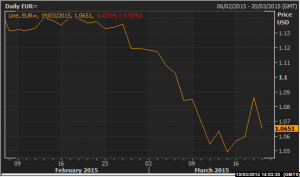And not simply because of Betteridge's Law of Headlines, a topic on which the writer, Paul Murphy, founder and editor of the Financial Times' flagship blog, FT Alphaville, could probably school me using only adverbs* but also because of the history of the Plaza and Louvre Accords.
From FT Alphaville:
Quite a bit of motion sickness in the world of FX on Thursday, with the sharp pullback in the dollar that followed Chair Yellen’s dropping of the Fed’s “patient” pledge on Wednesday now all but reversed…
So conventional wisdom has it that we’re back to the ‘mighty dollar‘ narrative where, if anything, the hike in US rates, if and when it arrives, will be the next big currency-boosting event.
On the other hand, there’s an argument that the dollar might simply stall.
David Bloom and Daragh Mayer at HSBC note that if you strip out the dollar mega-rallies of the early 1980s and mid-1990s, regular dollar rallies tend to come in pretty regular sizes: 20 per cent in dollar-index terms, typically over no more than 12 months. But we’ve now seen a move of 25 per cent since last June alone.
Indeed, Messrs Bloom and Mayer reckon the consensus arguments for additional $ strength are now getting stale…Currencies can trade higher for reasons other than the risk free rate.
Monetary policy divergence has clearly been a key driver to the shift in exchange rates, and offers a clear rationale for the movements we have already seen. But much of it is in the price. There may be a debate over the timing of the first Fed hike, but the market generally accepts that it will happen this year, and that rates will move up only slowly thereafter. One argument is the USD will continue to rise because US interest rates will rise a lot more than the market expects. Our view on this line of thinking is: if you think you know what is going to happen in the interest rate markets why are you trading the USD? Just trade the interest rates market instead....MORE
Let me cogitate for a while and in the meantime direct your attention to a couple sites.
The first, Calmerthanyouare.org queries "is betteridge's law of headlines correct?"
while the second is simply named "http://betteridgeslaw.com/"
*that's a grammar joke: if you have no nouns or verbs the verb modifier doesn't have much purpose.
Here's a Daily Mail headline from last June,
Is the lake pictured on every iPad secretly CURSEDDoes Betteridge's Law apply?
by the ghosts of disabled babies who were thrown
into its waters because they wouldn't survive?
